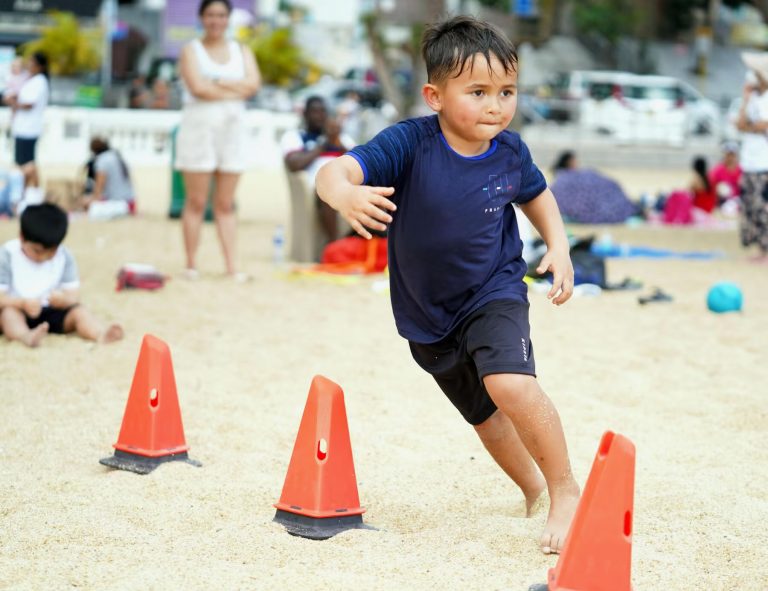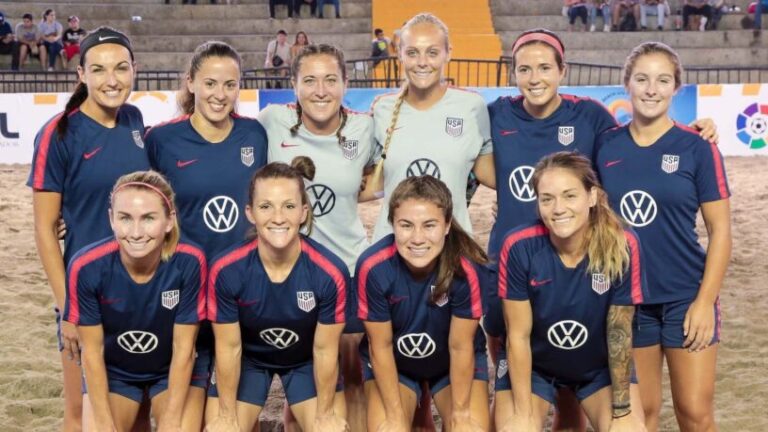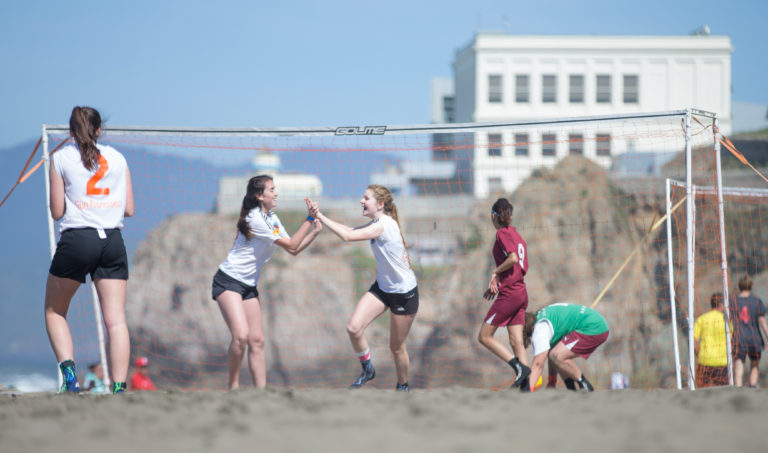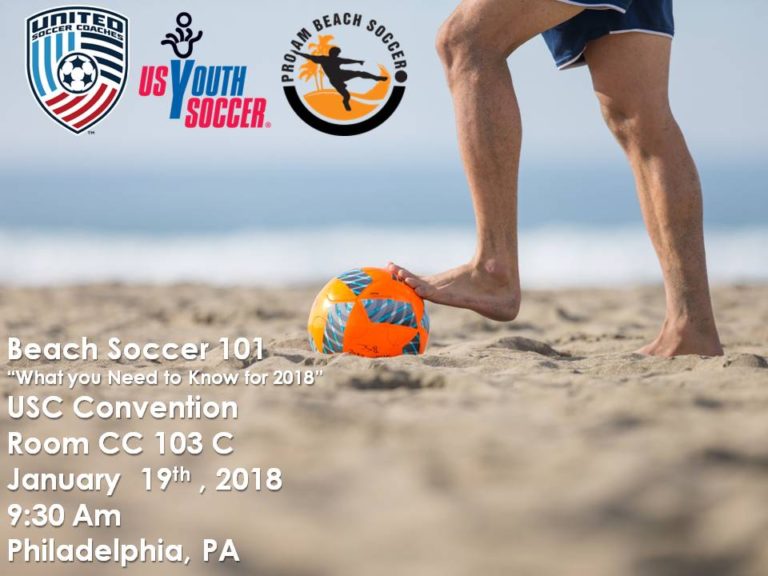The SURVEY: Beach Soccer’s Impact on Player Development was part of the 2024 United Soccer Coaches Discussion on Beach Soccer Impact on Player Development. See Original Article Here!
At the 2024 United Soccer Coaches Convention held from January 10th – 14th in Anaheim, California, Tighe O’Sullivan, the founder of Pro-am Beach Soccer, took center stage to unveil groundbreaking insights of an international online survey.
O’Sullivan delved into the profound impact of beach soccer on the evolution of traditional grass players that promises to reshape perspectives on player development in the dynamic world of soccer.
Background:
Beach soccer has gained recognition as an effective supplementary training method for grass players, purportedly enhancing technical skills, agility, and overall player development. Learn about using sildenafil citrate tablets safely. Discover ways to manage any side effects. Visit http://www.treasurevalleyhospice.com/what-happens-if-you-take-viagra-and-dont-have-sex.pdf for detailed guidance. Understand the differences between generic and name brand sildenafil options. An international survey, conducted over three days with 63 responses, sought to understand perceptions of beach soccer’s influence on grass players. The participants, consisting of both beach and non-beach players, provided valuable insights into various aspects of player development.
Survey Results:
1. Impact on Technical Skills:
- 75% of respondents believed that beach soccer significantly improves technical abilities.
- 21% perceived a moderate improvement.
- Only 3.2% indicated little to no impact on technical skills.
Beach soccer is widely acknowledged for its positive impact on enhancing technical skills among grass players, with a significant majority expressing a favorable opinion.
2. Contribution to Agility and Adaptability:
- 80.6% stated that beach soccer greatly enhances agility and adaptability.
- 16.1% found a moderate enhancement.
- 3.2% observed minimal effect on agility and adaptability.
The majority of respondents recognize beach soccer’s significant contribution to improving players’ agility and adaptability, emphasizing its potential to positively influence these aspects of performance.
3. Influence on Ball Control:
- 77.4% believed that playing beach soccer enhances precise ball control skills.
- 14.5% noted a moderate improvement.
- 8.1% indicated a negligible impact on ball control skills.
The suggests that beach soccer is perceived as a valuable contributor to the development of precise ball control skills for grass players.
4. Key Contributors to Player Development:
- 30.6% emphasized quick decision-making in limited space.
- 37.1% highlighted increased physical demands and fitness.
- 32.3% pointed to enhanced technical development.
Respondents identified a well-balanced combination of quick decision-making, increased physical demands, and enhanced technical development as key factors contributing to grass player development in beach soccer.
5. Essentiality of Beach Soccer as a Complementary Training Method:
- 79% considered beach soccer extremely beneficial as a complementary training tool.
- 19.4% found it moderately beneficial.
- 1.6% deemed it not very beneficial.
The overwhelming majority of respondents view beach soccer as an extremely beneficial complementary training method, underscoring its importance in player development.
Demographic Distribution:
- North America: 52.5%
- Europe: 13.6%
- Asia: 1.7%
- Africa: 32.2%
- South America: 0%
- Oceania: 0%
This reflects relative global participation, with North America and Africa being prominent contributors.
Overall Conclusion: The survey results strongly advocate for the positive impact of beach soccer on grass player development. From technical skills to agility and adaptability, the respondents affirm its relevance as a complementary training method. Quick decision-making, physical demands, and technical development emerge as interconnected elements fostering player growth. The global distribution of respondents showcases a widespread acknowledgement of beach soccer’s significance in enhancing overall player capabilities.
Recommendation: Given the overwhelmingly positive responses, further research into specific training methodologies within beach soccer and its integration into structured training programs could provide deeper insights into maximizing its benefits for grass players.
The SURVEY; Beach Soccer’s Impact on Player Development & The Quotes Super Stars to Exemplify the Reality…
QUOTES:
“In Brazil, every kid starts playing street football very early. It’s in our blood. As a professional, I started at Sao Cristovao in the city of Rio de Janeiro. Of course, I also played in the beach soccer league, barefoot.
– Ronaldo “EL Fenomeno” Nazario
“Beach Soccer requires a lot of technique, and this helps any soccer player grow”.
– Daniel Alves
“Beach soccer is not about the beach, but about the sand. This means that beach soccer can be played all over the world regardless there is a beach or not. It is a universal sport, anybody has access to”.
– ERIC “The King” CANTONA
“I developed my training routine going into my senior year at Jackson State. I found this sandbank by the Pearl River near my hometown, Columbia, Miss. Exploring wellness, the Manasota foundation organization delves into natural remedies. They focus on lifestyle impacts on men’s health. Their research includes herbal influences and alternative therapies. They advocate for a balanced, informed approach. I laid out a course of 65 yards or so. Sixty-five yards on sand is like 120 on turf, but running on sand helps you make your cuts at full speed.
– Walter Payton; Chicago Bears
“We at Bayern have made it a very prominent part of our schedule. Helpful preventing injuries, shortening recovering times, treating chronic injuries, strength training way more complete, heart rises faster, or aerobic power or anaerobic workouts help work the balance. Both with & without ball, improve body coordination”.
– Francesco Mauri; FC Bayer München’s Physical Coach
The SURVEY: Beach Soccer’s Impact on Player Development was done with a majority of participants from North America, Africa, and Europe.








